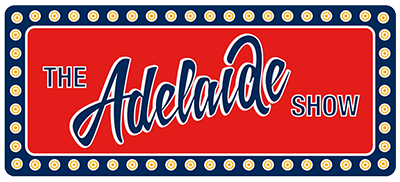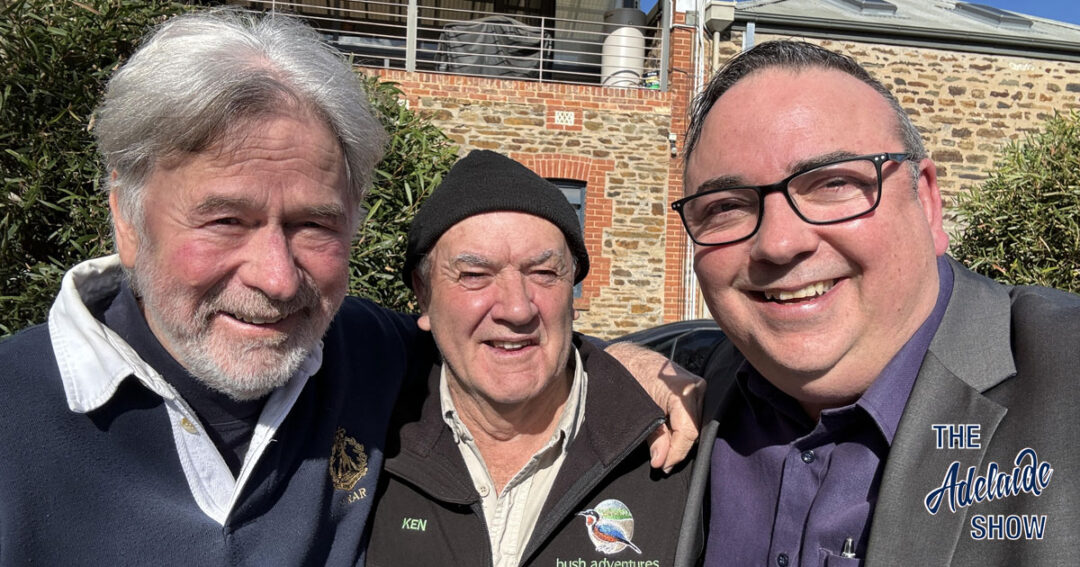In this special episode of The Adelaide Show, we celebrate NAIDOC Week by featuring two prominent South Australian storytellers, Uncle Ken Jones and John Schumann.
We’re thrilled to bring you a unique blend of conversation and music. Uncle Ken Jones from the Boandik community is here to talk about his deep connection to country and his incredible life stories, all from the heart of the Limestone Coast. And we’ve got John Schumann, whose songs capture the Aussie spirit in ways that stick with you long after the music stops. Expect to hear a few tunes throughout our chat, each telling a story that ties back to South Australia and South Australians.
There is no SA Drink Of The Week this week.
And we have made John’s interview an extended edition of the Musical Pilgrimage.
You can navigate episodes using chapter markers in your podcast app. Not a fan of one segment? You can click next to jump to the next chapter in the show. We’re here to serve!
The Adelaide Show Podcast: Awarded Silver for Best Interview Podcast in Australia at the 2021 Australian Podcast Awards and named as Finalist for Best News and Current Affairs Podcast in the 2018 Australian Podcast Awards.
And please consider becoming part of our podcast by joining our Inner Circle. It’s an email list. Join it and you might get an email on a Sunday or Monday seeking question ideas, guest ideas and requests for other bits of feedback about YOUR podcast, The Adelaide Show. Email us directly and we’ll add you to the list: [email protected]
If you enjoy the show, please leave us a 5-star review in iTunes or other podcast sites, or buy some great merch from our Red Bubble store – The Adelaide Show Shop. We’d greatly appreciate it.
And please talk about us and share our episodes on social media, it really helps build our community. Oh, and here’s our index of all episode in one concise
page
Running Sheet: South Australian Storytellers
00:00:00 Intro
Introduction
00:00:00 SA Drink Of The Week
No SA Drink this week.
00:03:37 Uncle Ken Jones
Here on The Adelaide Show, we shine a spotlight on South Australian passion, and my guest has passion in spades. He is Uncle Ken Jones, who I’m sitting with during NAIDOC Week 2024. I met Uncle Ken through his work running the tourism business, Bush Adventures, down on the Limestone Coast, at Port MacDonnell, and I’m hoping we’ll capture some of his profound connection to country, some of his wild story, and some of his storytelling and wisdom. Uncle Ken, welcome to the Adelaide Show.
Uncle Ken, in a recent story about you published on SouthAustralia.com, you’ve said, “I’m part of the oldest continuous culture in the world.” How does this profound connection influence your daily life and values?
Your parents deliberately hid your Aboriginal roots from you for much of your childhood, and in the story – which I will link to in the show notes – you reflect that upon discovering your Aboriginal heritage, you mentioned, “It was a shame factor.” I’d love to explore how this change in understanding about your identity affect your sense of belonging within Australian society?
But just before you answer, I want to add something else. Your dad said he kept you identity a secret because, “Aboriginal people were not particularly loved or cared for in those days.” We’re just about to hear from singer songwriter, John Schumann, and we’ll be chatting about his song, On Every Anzac Day, which honours Aboriginal Australians who fought in the Australian army, defending someone else’s king and defending land that had been taken away from them. Later in the song, the returned serviceman went to join his local RSL but was rejected because the people there didn’t see a fellow soldier, they saw a black fella. Songs like that make me think I would have done the same as your father. But maybe there is a cost.
Storytelling is clearly vital in Aboriginal culture. I remember hearing some dreaming stories shared by Aboriginal philosopher and author, Tyson Yunkaporta, and one, in particular about a crow and a magpie, has stayed with me ever since. Every time I see one of those birds, I remember the story about listening to your elders. It was the first time I understood the power of storytelling for passing on knowledge. How do you see storytelling among the Boandik people as similar to or different from mainstream Australian stories and the stuff we see on Netflix?
You’ve worked tirelessly to forge connections and share your culture. What common grounds have you found most effective in bridging cultural divides?
Looking to the future, you’ve expressed being “dangerously optimistic” about preserving Boandik Country’s legacy. What are your hopes for the next generation of both Aboriginal and non-Aboriginal Australians in creating a more inclusive and understanding society?
00:29:58 Musical Pilgrimage
In the Musical Pilgrimage, we feature an extended interview with John Schumann ahead of a special concert at The Gov on August 3, which we’ll be going to, in which John Schumann and the Vagabond Band will work through a stack of John’s back catalogue.
In an interview for an ABC radio documentary on John Schumann’s nation-changing song “I was only 19”, the noted rock historian Glenn A Baker concluded by saying “John Schumann is one of the finest songwriters this country has produced.” It’s hard to argue with that because John Schumann’s songs have that trace of red bulldust in them that is part bravado, part earthy wisdom, and they hang around your memory like flies in the Flinders Ranges. John, welcome back to The Adelaide Show.
John, you and the Vagabond Crew are doing a show with many of the John Schumann back catalogue numbers on August 3 at The Gov. And I did see a video clip of you bemoaning the fact that cover bands earn more money that original singer songwriters these days, so think of the concert as a John Schumann cover show. Clever stuff!!
We’re recording this chat during NAIDOC week 2024, so as part of our meander through some of your South Australian-specific songs, I want to start and end with two that involve First Nations stories. The first is On Every Anzac Day. Back in 2014, the then Chief of Army, LTGEN David Morrison, commissioned you to write a song to pay tribute to Indigenous men and women who served Australia because he was worried the Anzac Centenary was going to ignore them. Turns out he was right, in a way, because as the song documents beautifully, there’s the story of a black returned servicemen wanting to join his local RSL, only to be turned away because the people there only saw a black fella, not a soldier. Now, of course, when it comes to sacrifice and putting your life on the line, it’s not a competition but there’s something even more profound and filled with pathos and tragedy when you revere the fact that our Aboriginal soldiers put their lives on the line for someone else’s king to defend the land they had taken away from them. How does this song resonate with you today and have you seen any clarity in how to fathom the contrasts and the tragedy of these situations?
And who is singing with you on this?
In our last episode, 395, we waltzed through all the big political stories of the day and I was able to use five Redgum songs to set the context for each. The opposition’s call for nuclear power to be back on the agenda was accompanied by “Where Ya Gonna Run to?” There is the verse “Enrich the oxide out of Port Pirie and the toxic gases they won’t even see but where ya gonna go when the north wind blows, where ya gonna run to now”. Interestingly, there has been some fairly solid science to support nuclear energy over the years but as we pointed out last week, its time has passed. It takes too long to build, the costs will blow out, and we’ll be making more leaps and bounds with greener energy sources. Despite some of the work in its favour, you’re dead right in that song – a haunting thought is what happens when something goes wrong? Of course, that’s a quick, dramatic death, vs the slow drowning we’re all suffering from the burning of oil, gas, and coal. Where’s your thinking on this today?
In episode 394, we traced some South Australian links to the stories of Sherlock Holmes, including the ship, Bass Rock, which was mentioned in the story, The Adventure of the Abbey Grange, travelling from Adelaide to Southampton. Not all ships made it, of course, including the famous Star of Greece, which broke apart and ran aground in a violent storm off Port Willunga on the 13th July 1888. There’s some discrepancy in the actual number of lives lost, due to doubts about the number of people aboard the vessel when it left Port Adelaide, but most historians conclude that at least 18 perished. And one person who didn’t, was your great grandfather, who missed the boat and saved his life. Can you take us into this story some more, and the song that appears on Etched In Blue called Thunder Across The Reef?
Also, I have a recollection of hearing you perform this in Willunga – a special performance of etched in blue a long time ago – perhaps as part of a community arts project?
For the Children is a song you wrote in your last few months in Redgum. Your first child was two and you were getting dragged away on tour by Redgum’s management for 3 months at a time. For the Children explains, in part, why you left the band”. This is off rhyme or no rhyme – or really obtuse. Was that on purpose to invoke a mood of listlessness?
Who was the lady from the paper?
Have your kids ever used these words against you because sometimes we tap our higher, aspirational serves when writing and then life and foibles get in the way?
“Graduation Day”, is a poignant evocation of the toll taken on our police officers who are called to serve and protect our communities. It’s particularly raw here in the wake of the death of the son of our Police Commissioner, Grant Stephens. It was an unusual twist on the toll our people in blue pay. Another song about service in uniform. Some might think this contrasts with the Redgum bravado about ASIO printing out Redgum files so they can climb up to get to ours. Is it the writing class link between people on patrol?
I want to finish with “Just Fade Away”, in which we hear a story about explorer John McDouall Stuart. The people from the Arabana nation advised him to follow the birds if he wanted to find water. What a great story, connecting us back to Uncle Ken, too.
There’s a great Wall of sound – What’s making that haunting sound?
Here’s this week’s preview video
No preview video this week. But we do have our feature song.
SFX: Throughout the podcast we use free SFX from freesfx.co.uk for the harp, the visa stamp, the silent movie music, the stylus, the radio signal SFX, the wine pouring and cork pulling SFX, and the swooshes around Siri.
An AI generated transcript – there will be errors. Check quotes against the actual audio (if you would like to volunteer as an editor, let Steve know)

